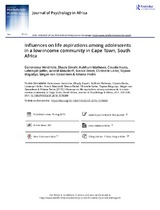Influences on life aspirations among adolescents in a low-income community in Cape Town, South Africa
Date
2015Author
Hendricks, Gaironeesa
Savahl, Shazly
Mathews, Kulthum
Metadata
Show full item recordAbstract
The aim of this study was to determine the influences on adolescents’ aspirations from a low-income community in Cape
Town. A sequential mixed method exploratory design was used following two distinct phases. The qualitative phase
comprised focus group interviews with 118 grade 12 learners attending a school in a low-income community (age range:
16–19 years) and focused on identifying factors influencing life aspirations. The quantitative phase with 191 adolescents
(males = 54.45 %, females = 45.55 %); age range: 14–18 years) from the same community aimed to ascertain the
influences of personal attributes on self-aspirations. Participants completed the Expectations/Aspirations measure, the
New General Self-Efficacy Scale, the Rosenberg Self-Esteem Scale and the Multidimensional Scale of Perceived Social
Support. Qualitative data were thematically analysed. Quantitative data were analysed using multiple regression. The
findings revealed that self-efficacy, self-esteem and social support were the most critical factors influencing adolescents’
aspirations. Self-efficacy was a major determinant of life aspirations among the adolescents. Life skills programmes with
youth from disadvantaged communities should seek to incorporate training aimed at developing adolescents’ self-efficacy.

